- Home
- John Irving
The Hotel New Hampshire
The Hotel New Hampshire Read online
The Hotel New Hampshire
John Irving
John living was born in Exeter, New Hampshire, in 1942, and he once admitted that he was a 'grim' child. Although he excelled in English at school and knew by the time he graduated that he wanted to write novels, it was not until he met a young Southern novelist named John Yount, at the University of New Hampshire, that he received encouragement. 'It was so simple,' he remembers. 'Yount was the first person to point out that anything I did except writing was going to be vaguely unsatisfying.'
In 1963, Irving enrolled at the Institute of European Studies in Vienna, and he later worked as a university lecturer. His first novel, Setting Free the Bears, about a plot to release all the animals from the Vienna Zoo, was followed by The Water-Method Man, a comic tale of a man with a urinary complaint, and The 158-Pound Marriage, which exposes the complications of spouse-swapping. Irving achieved international recognition with The World According to Garp, which he hoped would 'cause a few smiles among the tough-minded and break a few softer hearts.'
The Hotel New Hampshire is a startlingly original family saga, and The Cider House Rules is the story of Doctor Wilbur Larch -- saint, obstetrician, founder of an orphanage, ether addict and abortionist -- and of his favourite orphan, Homer Wells, who is never adopted. A Prayer for Owen Meany features the most unforgettable character he has yet created. A Son of the Circus is an extraordinary evocation of modern day India. John Irving's latest and most ambitious novel is A Widow for One Year.
Copyright (c) Garp Enterprises Ltd 1981
'A Birthday Candle' Copyright (c) 1957 by Donald Justice. This poem first appeared in The
New Yorker. 'On the death of Friends and Childhood' Copyright (c) 1959 by Donald Justice.
'Love Stratagems' Copyright (c) 1958 by Donald Justice. This poem first appeared in The
New Yorker. 'To a Ten-Months' Child' Copyright (c) 1960 by Donald Justice. 'Tales from a
Family Album' Copyright (c) 1957 by Donald Justice. These poems reprinted from The
Summer Anniversaries by permission of Wesleyan University Press.
'The Evening of the Mind' Copyright (c) 1965 by Donald Justice. This poem first appeared in Poetry. 'The Tourist from Syracuse' Copyright (c) 1965 by Donald Justice. 'Men of Forty' Copyright (c) 1966 by Donald Justice. This poem first appeared in Poetry. These poems
reprinted from Night Light by permission of Wesleyan University Press. 'I Forgot To Forget' Copyright (c) by permission of Stanley Kesler; Highlow Music Inc.
639 Madison Avenue, Memphis, Tn. 38130.
'I Love You Because' by Leon Payne Copyright (c) 1949 by Fred Rose Music, Inc. Used by permission of the Publisher. All rights reserved.
For my wife Shyla
Whose love provided
The light and the space
For five novels
The novelist is indebted to the following works and wishes to express his gratitude to the authors: Fin-de-Siecle Vienna, by Carl E. Schorske; A Nervous Splendor, by Frederic Morton; Vienna Inside-Out, by J. Sydney Jones; Vienna, by David Pryce-Jones and the Editors of Time-Life Books; Lucia di Lammermoor, by Gaetano Donizetti, the Dover Opera Guide and Libretto Series, (introduced and translated by Ellen H. Bleiler); and The Interpretation of Dreams, by Sigmund Freud.
With special thanks to Donald Justice. And with special thanks and special affection -- to Lesley Claire and the Sonoma County Rape Crisis Center of Santa Rosa, California.
On July 18, 1980 the Stanhope Hotel on Eighty-first and Fifth Avenue changed management and ownership and became the American Stanhope -- a fine hotel currently not beset by the problems of the Stanhope described in this fiction.
The Hotel New Hampshire
1 The Bear Called State O' Maine
The summer my father bought the bear, none of us was born -- we weren't even conceived: not Frank, the oldest; not Franny, the loudest; not me, the next; and not the youngest of us, Lilly and Egg. My father and mother were hometown kids who knew each other all their lives, but their 'union,' as Frank always called it, hadn't taken place when Father bought the bear.
'Their "union," Frank?' Franny used to tease him; although Frank was the oldest, he seemed younger than Franny, to me, and Franny always treated him as if he were a baby. 'What you mean, Frank,' Franny said, 'is that they hadn't started screwing.'
They hadn't consummated their relationship,' said Lilly, one time; although she was younger than any of us, except Egg, Lilly behaved as if she were everyone's older sister -- a habit Franny found irritating.
' "Consummated"?' Franny said. I don't remember how old Franny was at the time, but Egg was not old enough to hear talk like this: 'Mother and Father simply didn't discover sex until after the old man got that bear,' Franny said. 'That bear gave them the idea -- he was such a gross, horny animal, humping trees and playing with himself and trying to rape dogs.'
'He mauled an occasional dog,' Frank said, with disgust. 'He didn't rape dogs.'
'He tried to,' Franny said. 'You know the story.'
'Father's story,' Lilly would then say, with a disgust slightly different from Frank's disgust; it was Franny Frank was disgusted with, but Lilly was disgusted with Father.
And so it's up to me -- the middle child, and the least opinionated -- to set the record straight, or nearly straight. We were a family whose favourite story was the story of my mother and father's romance: how Father bought the bear, how Mother and Father fell in love and had, in rapid succession, Frank, Franny, and me ('Bang, Bang, Bang!' as Franny would say); and, after a brief rest, how they then had Lilly and Egg (Pop and Fizzle,' Franny says). The story we were told as children, and retold to each other when we were growing up, tends to focus on those years we couldn't have known about and can see now only through our parents' many versions of the tale. I tend to see my parents in those years more clearly than I see them in the years I actually can remember, because those times I was present, of course, are coloured by the fact that they were up-and-down times -- about which I have up-and-down opinions. Toward the famous summer of the bear, and the magic of my mother and father's courtship, I can allow myself a more consistent point of view.
When Father would stumble in telling us the story -when he would contradict an earlier version, or leave out our favourite parts of the tale -- we would shriek at him like violent birds.
'Either you're lying now or you lied the last time,' Franny (always the harshest of us) would tell him, but Father would shake his head, innocently.
'Don't you understand?' he would ask us. 'You imagine the story better than I remember it.'
'Go get Mother,' Franny would order me, shoving me off the couch. Or else Frank would lift Lilly off his lap and whisper to her, 'Go get Mother.' And our mother would be summoned as witness to the story we suspected Father of fabricating.
'Or else you're leaving out the juicy parts on purpose,' Franny would accuse him, 'just because you think Lilly and Egg are too young to hear about all the screwing around.'
'There was no screwing around,' Mother would say. There was not the promiscuity and freedom there is today. If a girl went off and spent the night or weekend with someone, even her peers thought her a tramp or worse; we really didn't pay much attention to a girl after that. "Her kind sticks together," we used to say. And "Water seeks its own level." ' And Franny, whether she was eight or ten or fifteen or twenty-five, would always roll her eyes and elbow me, or tickle me, and whenever I tickled her back she'd holler, 'Pervert! Feeling up his own sister!' And whether he was nine or eleven or twenty-one or forty-one, Frank always hated sexual conversations and demonstrations of Franny's kind; he would say quickly to Father, 'Never mind that. What about the motorcycle?'
'No, go on about the sex,' Li
lly would tell Mother, very humorlessly, and Franny would stick her tongue in my ear or make a farting noise against my neck.
'Well,' Mother said, 'we did not talk freely of sex in mixed company. There was necking and petting, light or heavy; it was usually carried on in cars. There were always secluded areas to park. Lots more dirt roads, of course, fewer people and fewer cars -- and cars weren't compact, then.'
'So you could stretch out,' Franny said.
Mother would frown at Franny and persevere with her version of the times. She was a truthful but boring storyteller -- no match for my father -- and whenever we called on Mother to verify a version of a story, we regretted it.
'Better to let the old man go on and on,' Franny would say. 'Mother's so serious.' Frank would frown. 'Oh, go play with yourself, Frank, you'll feel better,' Franny would tell him.
But Frank would only frown harder. Then he'd say, 'If you'd begin by asking Father about the motorcycle, or something concrete, you'd get a better answer than when you bring up such general things: the clothes, the customs, the sexual habits.'
'Frank, tell us what sex is,' Franny would say, but Father would rescue us all by saying, in his dreamy voice, 'I can tell you: it couldn't have happened today. You may think you have more freedom, but you also have more laws. That bear could not have happened today. He would not have been allowed.' And in that moment we would be silenced, all our bickering suddenly over. When Father talked, even Frank and Franny could be sitting together close enough to touch each other and they wouldn't fight; I could even be sitting close enough to Franny to feel her hair against my face or her leg against mine, and if Father was talking I wouldn't think about Franny at all. Lilly would sit deathly still (as only Lilly could) on Frank's lap. Egg was usually too young to listen, much less understand, but he was a quiet baby. Even Franny could hold him on her lap and he'd be still; whenever I held him on my lap, he fell asleep.
'He was a black bear,' Father said; 'he weighed four hundred pounds and was a trifle surly.'
'Ursus americanus,' Frank would murmur. 'And he was unpredictable.'
'Yes,' Father said, 'but good-natured enough, most of the time.'
'He was too old to be a bear anymore,' Franny said, religiously.
That was the line Father usually began with -- the line he began with the first time I remember being told the story. 'He was too old to be a bear anymore.' I was in my mother's lap for this version, and I remember how I felt fixed forever to this time and place: Mother's lap, Franny in Father's lap beside me, Frank erect and by himself -- sitting cross-legged on the shabby oriental with our first family dog, Sorrow (who would one day be put to sleep for his terrible farting). 'He was too old to be a bear anymore,' Father began. I looked at Sorrow, a witless and loving Labrador, and he grew on the floor to the size of a bear and then aged, sagging beside Frank in smelly dishevelment, until he was merely a dog again (but Sorrow would never be 'merely a dog').
That first time I don't remember Lilly or Egg -- they must have been such babies that they were not present, in a conscious way. 'He was too old to be a bear anymore,' Father said. 'He was on his last legs.'
'But they were the only legs he had!' we would chant, our ritual response -- learned by heart -- Frank, Franny, and I all together. And when they got the story down pat, eventually Lilly and even Egg would join in.
The bear did not enjoy his role as an entertainer anymore,' Father said. 'He was just going through the motions. And the only person or animal or thing he loved was that motorcycle. That's why I had to buy the motorcycle when I bought the bear. That's why it was relatively easy for the bear to leave his trainer and come with me; the motorcycle meant more to that bear than any trainer.'
And later, Frank would prod Lilly, who was trained to ask, 'What was the bear's name?'
And Frank and Franny and Father and I would shout, in unison, 'State o' Maine!' That dumb bear was named State o' Maine, and my father bought him in the summer of 1939 -- together with a 1937 Indian motorcycle with a homemade sidecar -- for 200 dollars and the best clothes in his summer footlocker.
My father and mother were nineteen that summer; they were both born in 1920 and raised in Dairy, New Hampshire, and had more or less avoided each other through the years they were growing up. It is one of those logical coincidences upon which many good stories are founded that they -- to their mutual surprise -- ended up having summer jobs at the Arbuthnot-by-the-Sea, a resort hotel that was, for them, far away from home, because Maine was far from New Hampshire (in those days, and to their thinking).
My mother was a chambermaid, although she dressed in her own clothes for serving dinner, and she helped serve cocktails under the tents to the lawn parties (which were attended by the golfers, the tennis and croquet players, and the sailors home from racing on the sea). My father helped in the kitchen, carried luggage, hand-groomed the putting greens, and saw to it that the white lines on the tennis courts were fresh and straight and that the unsteady people who should not have been on board a boat in the first place were helped on and off at dockside with a minimum of injury or getting wet.
They were summer jobs both my mother's and father's parents approved of, although it was a humiliation to Mother and Father that they should discover each other there. It was their first summer away from Dairy, New Hampshire, and they no doubt imagined the posh resort as a place where they could present themselves -- total strangers -- as also somewhat glamorous. My father had just graduated from the Dairy School, the private boys' academy; he'd been admitted to Harvard for the fall. He knew it would be the fall of 1941 before he'd finally get to go, because he'd set himself the task of making money for his tuition; but at the Arbuthnot-by-the-Sea in the summer of '39 my father would have been happy to let the guests and other help think he was headed for Harvard straight away. My mother being there, with her hometown knowledge of his circumstances, forced Father to tell the truth. He could go to Harvard when he made the money for what it would cost; it was some accomplishment that he could go at all, of course, and most of the people of Dairy, New Hampshire, had been surprised to learn he'd even been admitted to Harvard.
The son of the football coach at the Dairy School, my father, Winslow Berry, was not quite in the category of a faculty child. He was a jock's only son, and his father, whom everyone called Coach Bob, was not a Harvard man -- he was thought incapable, in fact, of producing Harvard material.
Robert Berry had come East from Iowa when his wife died in childbirth. Bob Berry was a little old to be single and a first-time father -- he was thirty-two. He came searching for an education for his baby boy, for which he offered himself, in trade, for the process. He sold his physical education abilities to the best prep school that would promise to take his son when his son was old enough to go. The Dairy School was not a bastion of secondary school education.
It might have once wished for a status equal to Exeter's or Andover's, but it had settled, in the early 1900s, for a future of compromise. Near to Boston, it admitted a few hundred boys who had been turned down by Exeter and Andover, and a hundred more who shouldn't have been admitted anywhere, and it gave them a curriculum that was standard and wise -- and more rigorous than most of the faculty who were employed to teach there; most of them had been turned down elsewhere, too. But, even second-rate among New England prep schools, it was far better than the area public schools and especially better than the only high school in the town of Dairy.
The Dairy School was just the kind of school to make deals, like the one it made with Coach Bob Berry, for a piddling salary and the promise that Coach Bob's son, Win, could be educated there (for free) when he was old enough. Neither Coach Bob nor the Dairy School was prepared for how bright a student my father, Win Berry, would turn out to be. Harvard accepted him among the first class of applicants, but he was ranked below scholarship level. If he'd come to them from a better school than Dairy, he probably could have won some kind of Latin or Greek scholarship; he thought he was good at languages a
nd at first wanted to major in Russian.
My mother, who (being a girl) could never go to the Dairy School, attended the private female seminary also in town. This was another second-rate education that was nonetheless an improvement over the public high school, and the only choice of the town's parents who wished their daughters to be educated without the presence of boys. Unlike the Dairy School, which had dormitories -- and 95 percent boarding students -- the Thompson Female Seminary was only a private day school. My mother's parents, who for some reason were even older than Coach Bob, wished that their daughter would associate only with the Dairy School boys and not with the boys from the town -- my mother's father being a retired Dairy School teacher (everyone called him Latin Emeritus) and my mother's mother being a doctor's daughter from Brookline, Massachusetts, who had married a Harvard man; she hoped her daughter might aspire to the same fate. Although my mother's mother never complained that her Harvard man had whisked her away to the sticks, and out of Boston society, she did hope that -- through meeting one of the proper Dairy School boys -- my mother could be whisked back to Boston.
My mother, Mary Bates, knew that my father, Win Berry, was not the proper sort of Dairy boy her mother had in mind. Harvard or no Harvard, he was Coach Bob's son -- and a delayed admission was not the same thing as being there, or being able to afford to go.
Mother's own plans, in the summer of '39, were hardly appealing to her. Her father, old Latin Emeritus, had suffered a stroke; drooling and addled, and muttering in Latin, he would totter about the Dairy house with his wife ineffectually worrying about him unless young Mary was there to look after them both. Mary Bates, at nineteen, had parents older than most people's grandparents, and she had the sense of duty, if not the inclination, to pass up the possibility of her own college education to stay at home and care for them. She thought she would learn how to type and work in the town. This summer job, at the Arbuthnot, was really meant to be an exotic summer vacation for her before she settled into whatever drudgery the fall would bring. With every year, she looked ahead, the Dairy School boys would get younger and younger -- until none of them would be interested in whisking her back to Boston.

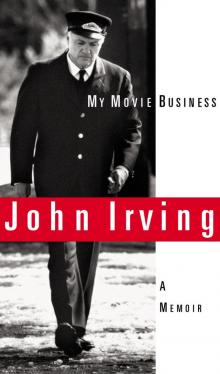 My Movie Business: A Memoir
My Movie Business: A Memoir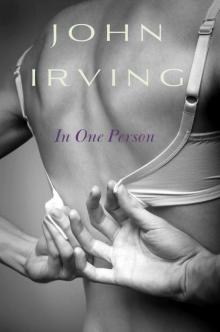 In One Person
In One Person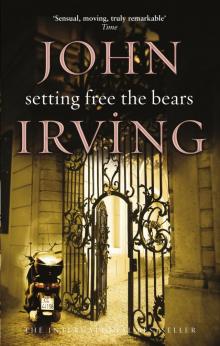 Setting Free the Bears
Setting Free the Bears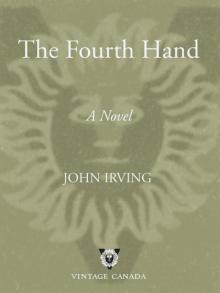 The Fourth Hand
The Fourth Hand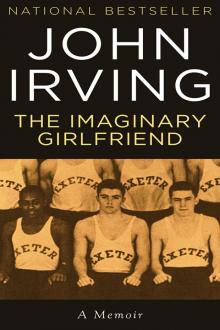 The Imaginary Girlfriend
The Imaginary Girlfriend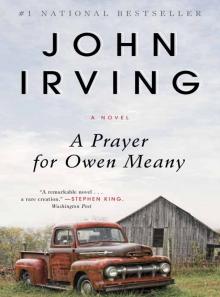 A Prayer for Owen Meany
A Prayer for Owen Meany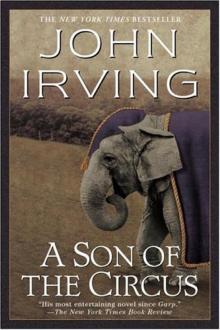 A Son of the Circus
A Son of the Circus Last Night in Twisted River
Last Night in Twisted River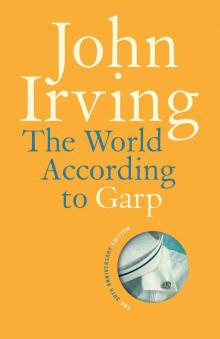 The World According to Garp
The World According to Garp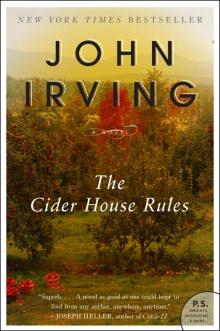 The Cider House Rules
The Cider House Rules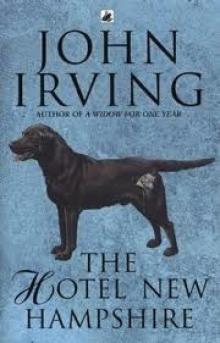 The Hotel New Hampshire
The Hotel New Hampshire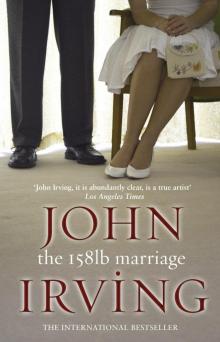 The 158-Pound Marriage
The 158-Pound Marriage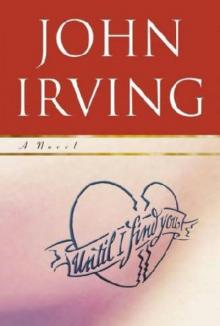 Until I Find You
Until I Find You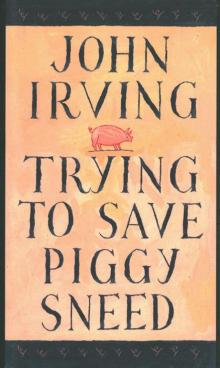 Trying to Save Piggy Sneed
Trying to Save Piggy Sneed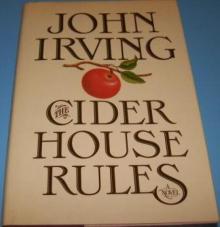 Cider House Rules
Cider House Rules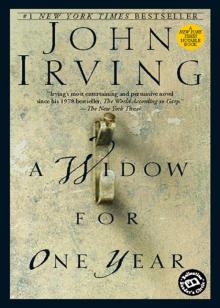 A Widow for One Year
A Widow for One Year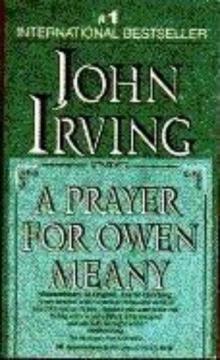 A prayer for Owen Meany: a novel
A prayer for Owen Meany: a novel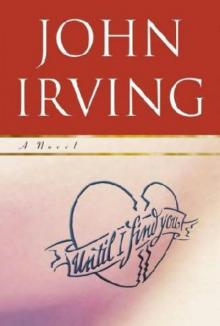 (2005) Until I Find You
(2005) Until I Find You